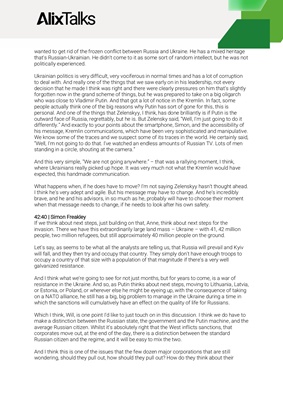
38:58 | Wendy Wysong
Well I think as soon as they start publishing the names of the companies and what they're
really doing, the reason that they're publishing those names is to try and encourage pressure,
and you end up seeing, you know, a lot of the companies are saying that "We have to withdraw
because of external pressure." Or "We have to withdraw because of the logistics in our supply
chain or we have to withdraw…". They don't come right out necessarily and say "We're doing
what's right, what the right thing is". Disney may be not sending new movies, but that was
their first move and then because of external pressure they pulled out more and more. But
companies are leaving for all different kinds of reasons, but there's certainly an impact that
social media is having. And you also have to consider the misinformation that's coming
through on social media and that's also got a huge impact. And whether or not the Russians
are being told what's really going on and the other countries are actually getting an accurate
picture of what's happening in Ukraine.
40:08 | William Lewis
Yeah can I ask this because maybe Tom or Guy for you. There is obviously some very clear
reasons why a lot of the sanctions have been put in place against individuals, against
companies. But I know a lot of people in business, and they wouldn't say it publicly, but they're
getting increasingly uncomfortable with people who appear to have got sanctioned because
they have a Russian sounding name. I think there was someone recently, a woman in London
who I think is the daughter of a Russian business person, whose main crime appeared to be
that she bought an apartment without a mortgage. What do we feel about the absence of
potentially the rule of law where something that you own, a property, a plane, whatever it may
be, can be seized by the state? Do we all feel comfortable about this?
41:05 | Tom Scampion
Well, you're jumping into the unexplained wealth order debate in the U.K. as to whether or not
that's an effective way to try and encourage more transparency. Of course, there is a big
debate between the U.S., I would say, and I'd love Wendy's view on this, a big debate between
the U.S. view of focusing on the effectiveness of sanctions. And in Europe there is a much
greater focus, I think traditionally, maybe it's changed the last six weeks on the rights of the
individual, especially when it comes to information sharing and data protection. And that is a
continual challenge, and therefore people will, of course, challenge whether or not they have
been fairly put on some of these lists.
Before Ukraine, there were significant steps that people had to jump through in the United
Kingdom to put people on these lists. You had to have a demonstrable case, given our legal
system, to prove that there was a reason for people being on these lists, whereas, of course,
there's the executive order focus in the U.S., and actually in the European Union. So, you did
have a tension then, between the rights of the individual to be fairly treated against actually
the rights of the states to create a safe, protective environment against things like bad actors,
terrorists, and so on.
So, I think this is kind of playing out in front of us as we speak, and I'll be interested to see
whether or not we reset the challenges between data privacy, information sharing, and the
right of the individual against the challenges of say, well, by information sharing, by embracing
the global approach to sanctions, we will be more effective in their execution. I think that will
become a very hot topic very soon.